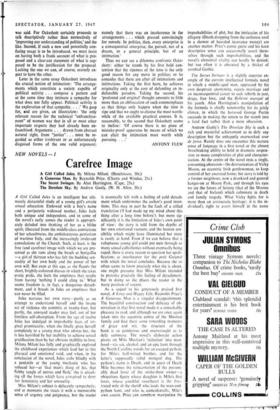NEW NOVELS — 1
Carefree Image
A Girl Called Jules. By Milena Milani. (Hutchinson, 30s.) A Generous Man. By Reynolds Price. (Chatto and Windus, 21s.) The Secret Swinger. By Alan Harrington. (Cape, 25s.) The Desolate Sky. By Andrew Ganly. (W. H. Allen, 30s.) A Girl Called Jules is an intelligent but ulti- mately distasteful study of a young girl's erratic sexual education. Endowed with a boy's name and a peripatetic widowed mother, Jules feels both unique and independent, and in some of the novel's early scenes the reader is appropri- ately deluded into thinking of her as a blithe spirit, liberated from the middle-class convictions of her schoolmates, the ambidexterous patriotism of wartime Italy, and the increasingly irrelevant consolations of the Church. Such, at least, is the free (and carefree) image with which we are pre- sented as she runs along the beach at Senigallia —a girl of thirteen who has felt the budding sen- suality of her own body and the power of her own will. But even at this age, as she flaunts the short, brightly-coloured dresses in which she takes erotic pride, she feels the emptiness that results from having 'nothing I could cling to.' What seems freedom is, in fact, a dangerous detach- ment, and it breeds in Jules an emptiness that can never be filled.
Jules narrates her own story—partly as an attempt to understand herself and the insane act of violence she commits at twenty-four, but partly, the annoyed reader may feel, out of her limitless self-absorption. From the age of twelve Jules has indulged in improbable feats of vir- ginal promiscuity; when she finally gives herself completely to a young man who adores her, she is less horrified by her inability to achieve sexual gratification than by her obvious inability to love. Milena Milani has fully and graphically explored the childhood experiences which lead her to this physical and emotional void, and when, in the conclusion of the novel, Jules stabs blindly with a penknife at the young, mechanic who has seduced her—at 'that man's thing of his, that flabby tangle of nerves and flesh,' she is attack- ing all the forces which have conspired to deny her femininity and her sensuality.
Miss Milani's subject is delicately sympathetic, and at moments she treats it with a memorable sense of urgency and poignancy, but the reader
is eventually left with a feeling of cold detach- ment which undermines the author's good inten- tions. This may in part be the fault of a stilted translation ('I had made up my mind about this thing after a long time before'); but more sig- nificantly it is the limitation of Jules's own point of view: the story is told from the depths of her own emotional vacuum, and the human sen- sibility which might have illuminated her story is rarely at hand. Even if we can believe that a voluptuous young girl could put men through so many sexual callisthenics without eventually being raped, there is every reason to question her quali- fications as interlocutor for the petit Guignol with which the novel concludes. Because she so often seems to know precisely what she is about, one might presume that Miss Milani intended to provoke precisely this feeling of detachment, but in doing so she places the reader in the nasty position of voyeur.
As a sequel to his generously praised first novel, A Long and Happy Life, Reynolds Price's A Generous Man is a singular disappointment. The beautiful construction and delicacy of ob- servation in that first novel made it a remarkable pleasure to read, and although we are once again taken into the eccentric centre of the Mustian family and find there some rewarding moments of grace and wit, the structure of the book is so ponderous and overwrought as to defy summary. The novel's elaborate action pivots on Milo Mustian's 'initiation' into man- hood—via sex, alcohol, and an epic hunt through the North Carolina woods for an escaped python, for Milo's half-witted brother, and for the latter's supposedly rabid mongrel dog. The python's name is Death, and in quest of Death Milo becomes the reincarnation of the presum- ably dead lover of the snake-show owner—a ubiquitous figure whose daughter is Milo's first lover, whose youthful sweetheart is the frus- trated wife of the sheriff who leads the man-and- python hunt, and who is, coincidentally, Milo's own cousin. Price can somehow manipulate the improbabilities of plot, but the intricacies of his allegory (Death dropping from the outhouse roof in a shower of hoarded insurance money) are another matter. Price's comic gusto and his keen descriptive sense can occasionally assert them- selves through such improbabilities, and the novel's elemental vitality can hardly be denied; but too often it is obscured by a thicket of cerebral Gothic.
The Secret Swinger is a slightly superior ex- ample of the current intellectual formula novel in which a middle-aged man, oppressed by his own desperate anonymity, rejects marriage and an inconsequential career to seek rebirth in jazz, drugs, free love, and the Boheme manqué of his youth. Alan Harrington's manipulation of the formula is chiefly noteworthy for its grisly climax, in which the harassed George Pectin succeeds in making the return to the womb into a fatal fact rather than a mere obsession.
Andrew Ganly's The Desolate Sky is such a rich and masterful achievement as to defy any description but the unhappily overworked tour de force. Rarely does one encounter this mature sense of language in a first novel or the almost breathtaking ability to hold in dramatic suspen- sion so many complexities of plot and character- isation. At the centre of the novel rests a single, consuming obsession—the determination of Vicky Moore, an eccentric Irish gentlewoman, to keep control of her ancestral home; her story is told by a former neighbour, now a drunkard and general hanger-on at Moore Park, and through his eyes we see the forces of history (that of the Moores and that of Ireland) which culminate in death and family tragedy. What Vicky fights for is more than an aristocratic heritage: it is the in- dividual's right to assert himself in the name of beauty and tradition and his own personal sense of values. The Desolate Sky is the story of phenomenal courage and a gratifying stub- bornness; its marvellously articulate wit and broadly compassionate vision constitute a memorable and by any standards a remarkably original achievement.
DAVID D. GALLOWAY



































 Previous page
Previous page